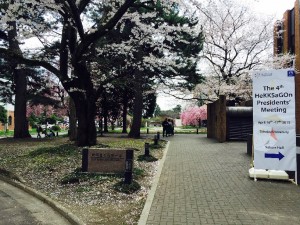From April 16 to 17, 2015, Tohoku University hosted the fourth presidents’ conference of the university consortium HeKKSaGOn, which is comprised of six leading universities from Japan and Germany, spear-headed by Kyoto University and Heidelberg University.
 Six leading, research-oriented universities from Japan and Germany founded HeKKSaGOn in 2010 at a first presidents’ meeting at Heidelberg University. Since then the presidential conference is successively hosted by one of the consortium’s member institutions, Kyoto University, Göttingen University, Tohoku University, Karlsruhe Institute of Technology and Osaka University. The fourth conference centred on the topic “Building venues for the creation of new knowledge and values,” held in Sendai, April 16-17th 2015.
Six leading, research-oriented universities from Japan and Germany founded HeKKSaGOn in 2010 at a first presidents’ meeting at Heidelberg University. Since then the presidential conference is successively hosted by one of the consortium’s member institutions, Kyoto University, Göttingen University, Tohoku University, Karlsruhe Institute of Technology and Osaka University. The fourth conference centred on the topic “Building venues for the creation of new knowledge and values,” held in Sendai, April 16-17th 2015.
The two-day program included talks between the presidents of the six member universities on future collaboration as well as meetings of over 130 researchers from various fields who have been working closely together since the beginning of the consortium if not earlier.
The consortium established nine working groups that continue to exchange ideas between the six universities and promote joint research projects:
- Life & Natural Science Fusion
- Coordination Chemistry for Energy Conversion, Catalysis & Nanotechnology
- Social Sciences & Humanities
- Disaster Risk & Response: Scientific & Technological Issues
- Dynamic Imaging for Physical, Chemical & Biological Interests
- Robotics: Challenges & Opportunities in the 21st Century
- Japanese-German Neuroscience Research Network Focusing on Psychosis, Affective
- Disorders & Related Traits
- Mathematics in Life Sciences, Material Science and Economy
Kyoto University sent three representatives from the Graduate School of Letters, Ito Kimio, Björn-Ole Kamm, and Nakamura Shohei, to participate in the Social Sciences & Humanities working group session, which was organised by Harald Fuess (Heidelberg) and Irie Yukio (Osaka). Continuing the work from previous sessions, the meeting focused on the theme of transformation and creation of cultural values in a global context. Aspects of translation and transformation link to the present phenomenon of a simultaneous unification and diversification of cultural values and social schemes in a globalising world. This session aimed to showcase historical research on these processes as well as the possibility of creating new schemes for the future. In three sections, researchers from Kyoto, Heidelberg, Osaka and Tohoku discussed questions of translating and comparing cultures, imagined communities beyond the nation-state, and international world orders, ranging from politics and law to aesthetics and medicine.
The participating researchers can look back on a number of existing cooperation projects, including several joint summer schools as well as, for example, a number of successful grant applications to further student and teacher mobility. The Graduate Schools of Letters and Economics at Kyoto University signed a new memorandum of understanding with the research Cluster “Asia and Europe” of Heidelberg University for this purpose in 2013 and are currently preparing a joint degree programme in the humanities – one of the main aims of collaboration designated by the HeKKSaGOn consortium. Seeking to enhance their cooperation, Kyoto University and Heidelberg University furthermore established liaison offices on each other’s campuses in 2014 and 2015.
The fourth HeKKSaGOn meeting concluded with the presidents signing a joint statement to put into practice future plans of collaboration. They especially pledged to promote the achievements of the working groups, ease the transfer of credits between the institutions for students, and to establish funds for researcher mobility focusing on up-and-coming young scientists and new talents in the many fields of research conducted at the six universities.
The next conference is scheduled for 2016 and will be hosted in Germany by Karlsruhe Institute of Technology.
Links:
Kyoto University European Center, Heidelberg Office
Heidelberg University Office Kyoto



